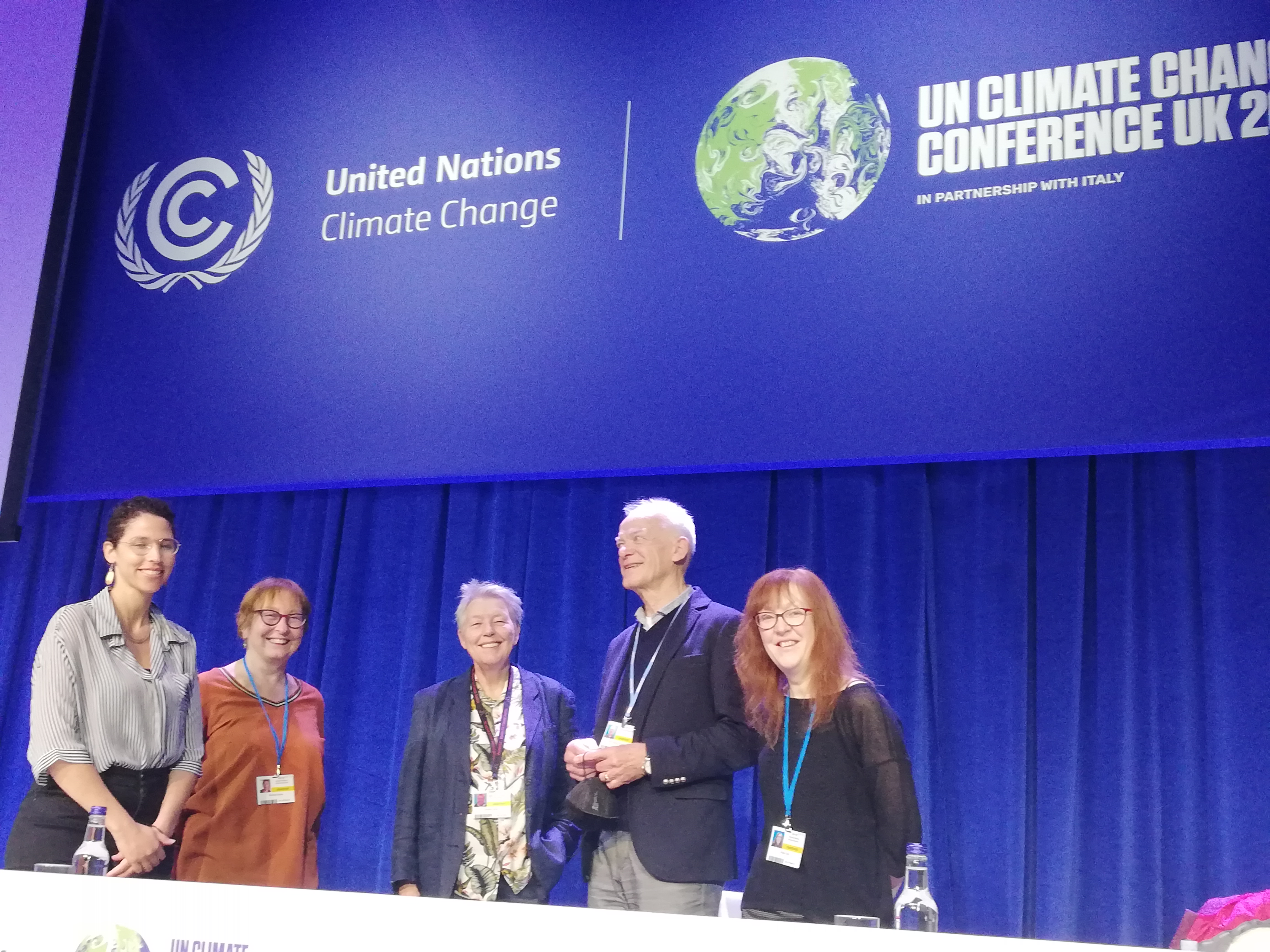COP26 as a meet and greet of the Global North – male, pale and stale*
From the very beginning, attending this year’s COP has been challenging for civil society groups and delegates from Global South countries. The way to organizing the COP, whilst the world is still facing a global pandemic and people unequally suffer its consequences, has been sided with much controversy.
Attendance for civil society from the Global South has always been challenging, due to financial as well as travel restrictions. This year’s COP and the measures by the UK presidency however, has excluded even more voices of the most vulnerable, most affected and least heard people during these negotiations. We wish to express our concern that this year’s COP is far from inclusive. Already, the planning of the event reflected a lack of transparency and communication. Decisions made by the UK government had been communicated in a haphazard manner, with confusion surrounding the nomination process and vaccination and travel requirements. Although we were cognizant of issues relating to the pandemic and the inability to accurately predict conditions for such a large event, along with the associated planning challenges, we joined the voices in advance of the COP26 stating that an in-person COP would be neither feasible nor advisable. The Women and Gender Constituency (WGC) had for these reasons, alongside other civil society organizations, demanded the postponement of the COP26. Going through with the original plan from the UK presidency, this COP26 has be one of the most whites and most privileged COPs ever and this is reflected in regressions on gender and human rights in the negotiation outcomes.
Gender and Human Rights Cut - Financial Targets Not Reached
Countries of the Global North could not agree on a fund for loss and damage but mere technical support, leaving countries from the Global South without these financial resources urgently needed to face climate change impacts, says Gotelind Alber, co-founder of GenderCC. For the emission trading scheme human rights were watered down, while market believers got their way by introducing credits, which do not have to meet any sustainability and human rights criteria. For Indigenous Peoples and frontline communities this means facing climate disasters without adequate financial supported, while their territorial rights and lands are at risk to be affected by the global carbon markets!
Nuclear Power is not green!
We are worried, says Farina Hoffmann, how nuclear power was advocated as a solution to the energy transition at COP26. Nuclear power is dangerous, expensive, leaves large amounts of radioactive waste, pollutes lands and people and violates human and Indigenous rights! Unlike what lobbyists would like to make us believe, Hoffmann argues, Uranium mining and milling is very energy intensive and leads to large amounts of CO2 emissions. Women are more likely to suffer and die of radiation-induced cancer and have led the fight against nuclear power all over the world, she adds. We will rise against these false solutions again!
The COP26 has shown that critical voices from the Global South were missing. It gave more than 500 lobbyists of oil, gas and nuclear energy and countries from the Global North the chance to advocate their agenda of false solutions through market mechanisms, nature-based solutions and net zero promises! Key demands of the Women and Gender Constituency (WGC) such as keeping 1.5°C alive, delivering on finance, loss and damage, as well as putting gender and human rights at the center of Article 6 and the implementation of the Paris Agreement were not met.
*The title is a quote from Greta Thunberg and Laura Young.
GenderCC-Women for Climate Justice at COP26
WGC COP26 Key Demands
The Women and Gender Constituency (WGC) have outlined their key demands for the outcomes of COP26. The key demands are as following:
1) Fulfill commitment to human rights in the Paris Agreement & keep 1.5 alive
2) Deliver on finance and prioritise loss & damage
3) Ensure human rights & ecosystem integrity in Article 6
4) Advance the Gender Action Plan
5) Reject false solutions & invest in gender-just climate action
6) Facilitate gender-just transitions to a regenerative economy
7) Invest in resilient, gender-transformative, climate justice education
8) Promote health, including sexual and reproductive health and rights
9) Ensure rights to water and sanitation in all climate action
10) Protect the ocean, cryosphere, coastal ecosystems and local communities Ensure collective women’s land rights
You can download the full key demands here.
Find out more about the activities of the Women and Gender Constituency
COP26 Side event : Engaging Citizens In Urban Climate Action For Inclusive Just Transition Programs
List of speakers:
- Gotelind Alber (GenderCC)
- Gillian Dick (City Council Glasgow)
- Rony Erez (Heschel Center)
- Tine Heyse (Climate Alliance of European Cities and Mayor for Environment, Climate, Energy and North-South, City of Ghent, Belgium)
- Karl-Ludwig Schibel (Climate Alliance Italy)
Time and date: 04 November, 2021, 11:30-12:45
Location: Blue Zone, Loch Lomond (144 pax)
The event will look at five different experiences of how to engage citizens in climate action that have in common the understanding that only strong co-productive action of governments and citizens will make the ecological conversion happen. The radical changes we have before us need strong forces that act “from below” and involve social groups that in the past have received little attention in the dominant technocratic approach from above.
The Programme of the side event is available here. You can watch the event online here.

COP26 Side Event: Uncovering justice gaps in Just Transitions – why technological solutions won’t solve the crises
List of speakers:
- Ndivile Mokoena (GenderCC / South Africa)
- Dunja Krause (UNRISD)
- representative of ETC Group
- representative of Life e.V. // Moderated by representative of Rosa-Luxemburg-Stiftung
Time and date: 05 November 2021, 16:45-18:00
Location: Blue Zone, South Downs (Multimedia Studio 1)
This event will showcase justice implications of different visions and narratives for low-carbon mobility and sustainability transitions and uncover justice gaps in technology-driven approaches.
The Programme of the side event is available here. You can watch the event online here.
Green Zone Event: Not Without Us! - Pathways to a Gender Just Transition
List of Speakers:
- Ndivile Mokoena, GenderCC Southern Africa
- Dunja Krause, UNRISD
- Melissa Moreano, Critical Geography Collective, Ecuador (facilitator)
- Representative from South Asia
Time and date: 09 November 2021, 10:00 - 11:30
Location: Green Zone, Cinema Auditorium
This event will debate the interlinkages between gender justice and just transition. How do lived experiences differ for women when it comes to the impacts of the climate crises and how do they deal with it? How can the coping mechanism developed by women in different sectors influence the just transition debates? Are current just transition debates taking into account care work and gender segregation in the labour market? And what would a gender just transition look like? Read more about the event.
If you are unable to attend in person you can watch it online.
In Person Panel "Life at the Center: Towards Feminist Climate Justice"
The panel will be about the feminist critique of false solutions to climate change, how feminist economics confronts extractive capitalism, how women and gender diverse peoples sustain and reproduce human and non-human life, and what feminist climate justice looks like.
Contributors:
- Dinda Yuura, Solidaritas Perempuan, Indonesia
- Francisca Fernández Droguett, Movimiento por el Agua y los Territorios-MAT, Chile
- Liliana Buitrago, Observatorio de Ecología política de Venezuela
- TBC Facilitation and comments: Melissa Moreano
- PLACJC y Colectivo de Geografía Crítica del Ecuador
Time and date of the panel: 10 November, 2021, 2:00 pm UTC+0
Location: Adelaide Place, 209 Bath Street, Glasgow, G2 4HZ United Kingdom
You can register for the event here.
The Climate Briefing
The Podcast from the Energy, Environment and Resources Programme at Chatham House has released its 19th episode on the topic of "Gender and climate policy". In this episode, Nina Jeffs (Schwarzman Academy Fellow in the Environment and Society Programme) explores the relationship between gender and climate change. First she speaks with two young climate justice activists - Renata Koch Alvarenga and Zainab Yunusa - to find out more about how climate change is affecting women and girls in Brazil and Nigeria, and how women and girls are leading solutions to these challenges. Then she is joined by Gotelind Alber (Co-founder of Gender CC) to discover how gender-responsive approaches are being embedded within UNFCCC negotiations.
Credits:
Speakers: Gotelind Alber, Renata Koch Alvarenga, Zainab Yunusa Host: Nina Jeffs Editor: James Reed Sound Services Recorded and produced by Chatham House
